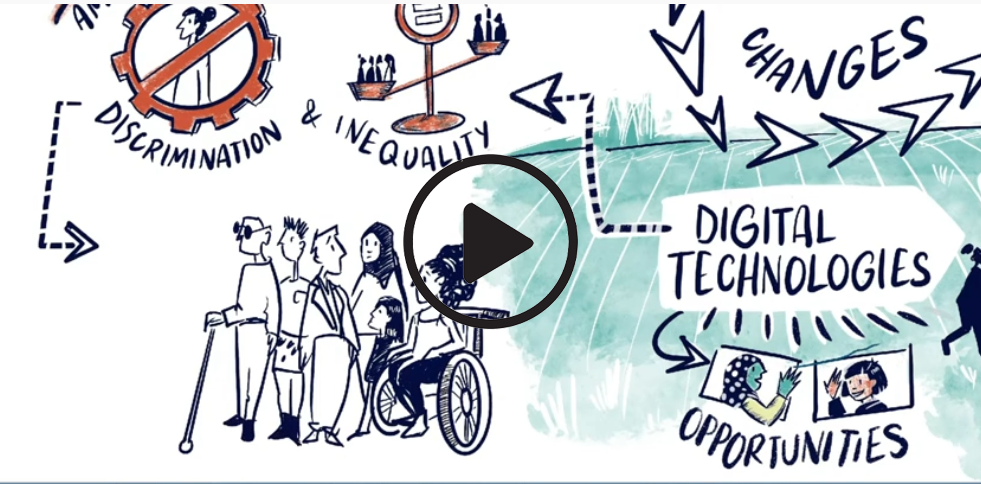Decolonising digital rights
European Digital Rights (EDRi) and its partner Digital Freedom Fund (DFF) initiated the decolonising digital rights initiative in 2020, which aims to design a process to develop a decolonising program for the digital rights field in Europe.
This process includes more than 30 people and roughly 24 organisations working on racial and social justice issues, as well as organisations from the current digital rights field and funders. Efforts are also being made to include and bring on board the wider network of 45 EDRi members across Europe. The following EDRi members are active members of an EDRi led decolonising working group: Statewatch, HomoDigitalis, Share Foundation, Alternatif Bilisim, GFF, BoF and Article 19.
Meet the participantsRead more about EDRi's work

Digital Dignity Pool Digital technologies can have a profound effect on our societies, but sufficient attention is rarely given to how certain applications differentiate between, target and experiment on communities at the margins. This document pool gathers resources for those that are interested in learning about and contesting the harms to dignity and equality that arise from uses of technology and data.
Read more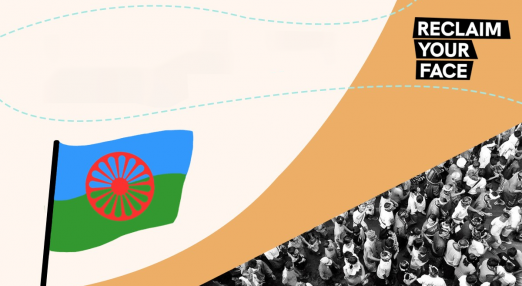
Romani rights and biometric mass surveillance The rights of Romani people should be an important topic for anyone that cares about digital rights. In this blog, hear from experts in Roma, Sinti and digital rights about why facial recognition is an important issue (and what the rest of the digital rights community can learn), and check out the Reclaim Your Face campaign’s first ever resource in the Sinti language!
Read more
Digital Dignity Workshops to explore intersection of rights, justice & AI / biometrics We have already seen that racialised groups, migrants, LGBTQI+ communities, people with disabilities, working class people, women, sex workers and many other minoritised, and historically-excluded communities and individuals are the first to suffer from the ways in which technology can amplify biases, surveil, classify and much more. In two launched workshops in December, we started to collectively explore how the use of technologies can increase systemic inequality, and to build a coalition of groups across Europe to contest and resist digital surveillance, facial recognition and digital discrimination.
Read more
If AI is the problem, is debiasing the solution? The development and deployment of artificial intelligence (AI) in all areas of public life have raised many concerns about the harmful consequences on society, in particular the impact on marginalised communities. EDRi's latest report "Beyond Debiasing: Regulating AI and its Inequalities", authored by Agathe Balayn and Dr. Seda Gürses,* argues that policymakers must tackle the root causes of the power imbalances caused by the pervasive use of AI systems. In promoting technical ‘debiasing’ as the main solution to AI driven structural inequality, we risk vastly underestimating the scale of the social, economic and political problems AI systems can inflict.
Read more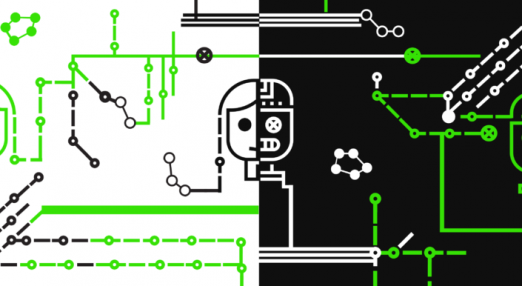
Computers are binary, people are not: how AI systems undermine LGBTQ identity Companies and governments are already using AI systems to make decisions that lead to discrimination. When police or government officials rely on them to determine who they should watch, interrogate, or arrest — or even “predict” who will violate the law in the future — there are serious and sometimes fatal consequences. EDRi's member Access Now explain how AI can automate LGBTQ oppression.
Read more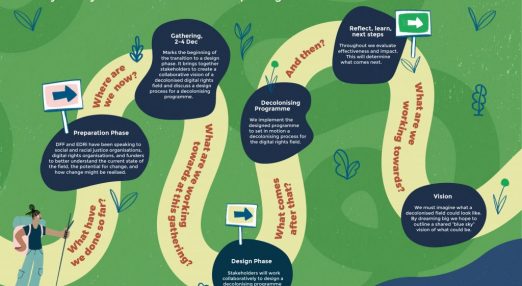
Envisioning a Decolonised Digital Rights Field – and Charting Next Steps This week, a group of 30 participants, working on issues of racial, social and economic justice, digital rights, and in philanthropy, came together to not only collectively imagine just that, but also to identify the building blocks for a process that might help us get there.
Read more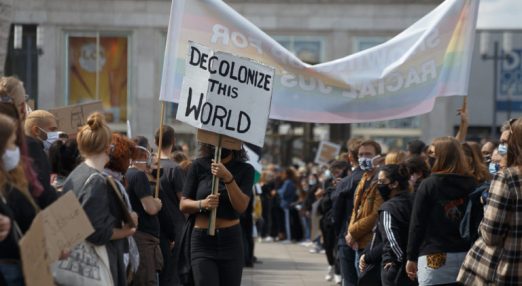
Creating Conditions for a Decolonised Digital Rights Field Since 2019, DFF and EDRi have been working to initiate a decolonising process for the digital rights field. Reflecting on the increased challenges to our digital rights, we realised how imperative it is that the field truly reflects everyone in European society. This means improving representation in the digital rights field, but more crucially undoing the power structures preventing us from protecting digital rights for everybody.
Read more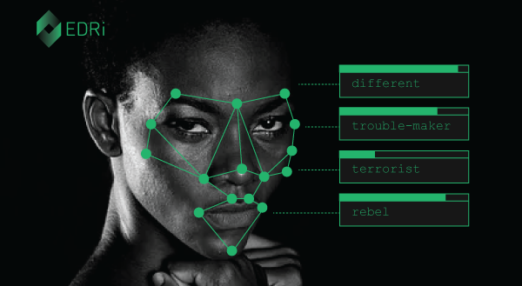
Facial recognition and fundamental rights 101 This is the first post in a series about the fundamental rights impacts of facial recognition. Private companies and governments worldwide are already experimenting with facial recognition technology. Individuals, lawmakers, developers - and everyone in between - should be aware of the rise of facial recognition, and the risks it poses to rights to privacy, freedom, democracy and non-discrimination.
Read more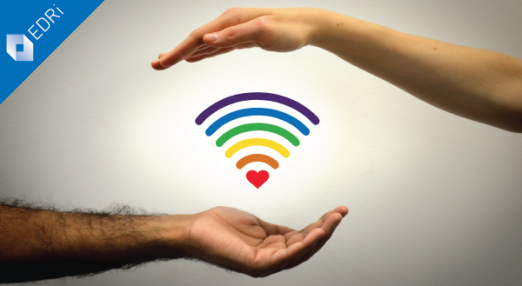
The digital rights of LGBTQ+ people: When technology reinforces societal oppressions Online surveillance and censorship impact everyone’s rights, and particularly those of already marginalised groups such as lesbian, gay, bisexual, transgender and queer and others (LGBTQ+) people. The use of new technologies usually reinforces existing societal biases, making those communities particularly prone to discrimination and security threats. As a follow-up to Pride Month, here is an attempt to map out what is at stake for LGBTQ+ people in digital and connected spaces.
Read more
Building a coalition for Digital Dignity In 2020 EDRi started to build the ‘Digital Dignity Coalition’, a group of organisations and activists active at the EU level dedicated to upholding rights in digital spaces and resisting harmful uses of technology. We’ve been organising to understand and resist how technological practices differentiate, target and experiment on communities at the margins - this article sets out what we’ve done so far.
Read more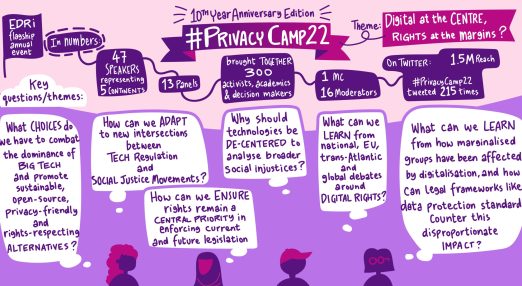
#PrivacyCamp21: Event Summary The theme of the 9th edition of Privacy Camp was "Digital rights for change: Reclaiming infrastructures, repairing the future" and included thirteen sessions on a variety of topics.
Read more
Technological Testing Grounds: Border tech is experimenting with people’s lives The European Union is increasingly experimenting with high risk migration management technologies.
Read MoreRead more about DFF’s work
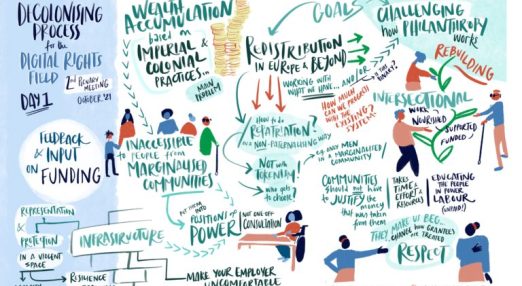
Decolonising Digital Rights: The Challenge of Centring Relations and Trust In 2020, a group of people from DFF and European Digital Rights (EDRi) recognised that the digital rights field wasn’t currently equipped enough to holistically address technological harms as a product of multiple and intersecting types of oppressions. This recognition was informed by the acknowledgment of missed opportunities and the harms the current siloed approach led to, but also by the hope, desire and visions of another digital reality.
Read more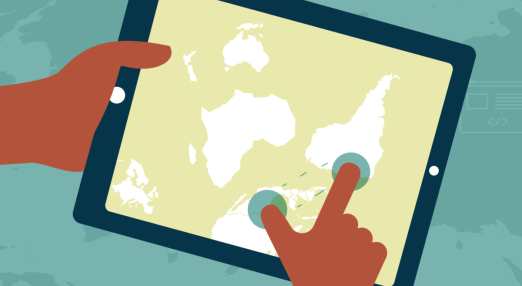
Decolonising the Field, Decolonising Ourselves On kicking off phase II of the decolonising process for the digital rights field DFF is facilitating together with European Digital Rights (EDRi).
Read more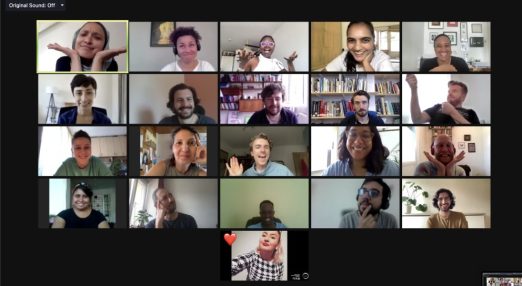
Decolonising Phase II: Ready to Fumble On 17 and 18 June 2021, DFF and European Digital Rights (EDRi) held the kick-off meeting that started the second phase of our decolonising process. Over the course of one year, we will collaborate on designing a multi-year programme to start decolonising the digital rights field.
Read more
Creating Conditions for a Decolonised Digital Rights Field During the DFF strategy meeting 2021, participants organised two sessions on “decolonising digital rights.” A public panel discussion on “Decolonising Data” was also held on the sidelines of the strategy meeting, made possible largely because the strategy meeting happened online for the first time. Here are some reflections.
Read more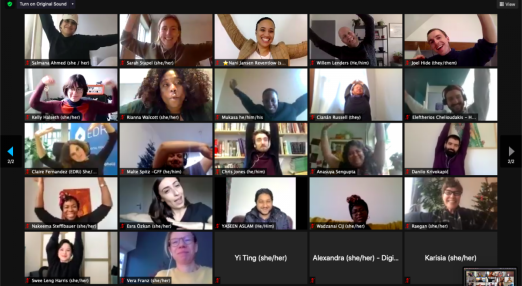
Envisioning a Decolonised Digital Rights Field – and Charting Next Steps How do we create change? Numerous books, essays and TED talks have been dedicated to this question, and courses have been designed to equip us to change policy, workplace environments, and numerous other contexts. A crucial ingredient seems to be having a vision of what that change should look like: what is the point on the horizon to set your compass towards?
Read more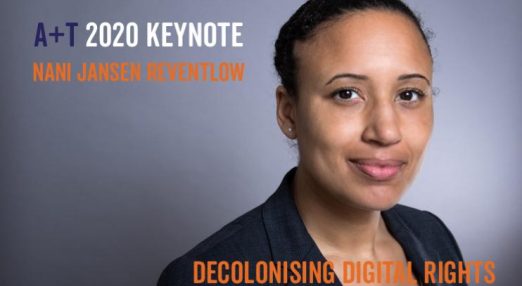
Decolonising Digital Rights: Why It Matters and Where Do We Start? The power structures underlying centuries of exploitation by one group of another are still here. What does this mean for our societies? What would things look like if they were different? How do we get there –– or: how do you decolonise society? How do you decolonise technology? And how do you decolonise digital rights?
Read more
